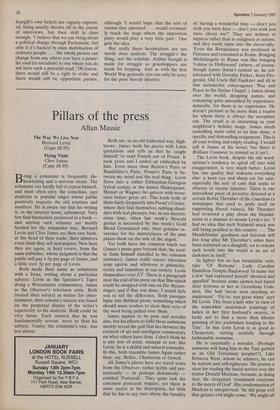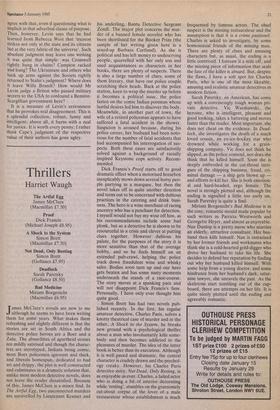Pillars of the press
Allan Massie
The Way We Live Now Bernard Levin (Cape £8.95) Flying Visits Clive James (Cape £8.95)
Being a columnist is frequently dis- heartening and a nervous strain. The columnist can hardly fail to repeat himself, and must often envy the comedian, jazz musician or popular singer whose public positively requests the old routines and numbers. He is aware too that his writing is, in the strictest sense, ephemeral. Very few find themselves preserved in a book — and anyway such volumes are mostly headed for the remainder tray. Bernard Levin and Clive James are then rare birds, at the head of their trade; their admirers even claim they sell newspapers. Now here they are again, in hard covers, from the same publisher, whose judgment is that the public will pay 4.5p per page of James, and a little over 3p per page of Levin.
Both made their name as columnists with a focus, writing about a particular subject: Levin as the Spectator's Taper doing a Westminster commentary, James as the Observer's television critic. Both treated their subject as matter for enter- tainment; their column's success was based on the perpetual display of the writer's superiority to his material. Both could be very funny. Each insisted that he was fundamentally serious, more so than his subject. Vanity, the columnist's vice, was not absent. Both are, in an old-fashioned way, high- brows. James lards his pieces with Latin quotations and tells us that he taught himself `to read French out of Proust. It took years and I ended up enthralled by him. Even more than Renoir's Paris or Baudelaire's Paris, Proust's Paris is be- tween my mind and the real thing'. Levin flows into a rather Edwardian-Georgian lyrical ecstasy at the names Shakespeare, Mozart or Wagner; he quivers with rever- ence before great art. This leads both of them fairly frequently into Pseud's Corner, where they find themselves rubbing shoul- ders with real phoneys, but, in our meretri- cious time, when last week's Nescafe genius is succeeded by this week's Gold Blend Granulated one, their genuine re- verence for the masterpieces of the past places them on the side of the angels.
Yet both have the common touch too (James's prose goes beyond that; the read- er finds himself clutched in the common embrace); James really enjoys television soap operas and whatever is gimmicky, ersatz and transitory in our society. Levin rhapsodises over ET. There is a paragraph near the end of his piece on that film which could be swapped with one on Die Meister- singer; and if that was done, I would defy you to tell the difference. Both passages lapse into Biblical prose, something which should warn readers to clear their eyes of the wool being pulled over them.
James aspires to be poet and novelist also, but his efforts to fulfil those ambitions merely reveal the gulf that lies between the creation of art and intelligent commentary on what others have done. I don't think he is any sort of artist, manqué or not; like Levin, he is a skilful and natural journalist. In this, both resemble James Agate rather than, say, Belloc, Chesterton or Orwell.
All James's pieces here are travel notes from the Observer, rather feebly and pre- tentiously — or perhaps defensively — entitled 'Postcards'. They quite lack the concision postcards require; yet there is some justice in the description, for little that he has to say rises above the banality of 'having a wonderful time — don't you wish you were here — don't you wish you were clever me?' They are written to impress rather than to enlighten or inform, and they easily lapse into the clever-silly: 'Even the Renaissance was produced in Florence and consumed in Rome. Bringing Michelangelo to Rome was like bringing Tolstoy to Hollywood' (where, of course, though James doesn't remind us, he col- laborated with Dorothy Parker, Scott Fitz- gerald, Old Uncle Bill Faulkner and all in that technicolor extravaganza War and Peace in the Sistine Chapel'.) James skims over the world, dropping names, and remaining quite untouched by experience; naturally, for there is no experience. He doesn't pretend to be more than a tourist for whom there is always the aeroplane out. The result is as interesting as your neighbour's holiday snaps. James needs something more solid to let him shine, a specific and demanding assignment. This is all easy writing and empty reading. I would call it James at his worst; but there is Brilliant Creatures to remind us it isn't.
The Levin book, despite the old word- spinner's tendency to spiral off into wild .exaggeration, is very much better. Levin has one quality that redeems everything else: a keen eye and sharp ear for cant, especially the sort of cant that seeks to obscure or excuse injustice. There is one marvellous piece of invective directed at a certain Robin Thomber of the Guardian (a newspaper that used to pride itself on supporting liberal values). Mr Thornber had reviewed a play about the Mandel- stams in a manner to arouse Levin's ire: 'I had no idea that such Stalinoid muck was still being peddled in this country. . . The Mandelstams' goodness and heroism will live long after Mr Thomber's ashes have been scattered on a dunghill; yet to release such words into the world is an act of darkness in itself.'
In lighter but no less formidable vein, take 'Of Bottoms'. Lady Caroline Hamilton-Temple-Backwood `to name but a few' had expressed herself 'shocked and appalled' because some airmen had bared their bottoms at her at Greenham Com- mon. She had 'never seen anything so unpleasant'. `Go to, you great ninny' says Mr Levin. This from a lady who 'in view of the somewhat anatomical paintings of ladies in her first husband's oeuvre, is lucky not to find a more than lifesize painting of her pudendum hanging in the Tate'. In this form Levin is as good as Chesterton, cutting zestfully through fashionable nonsense.
He is essentially a moralist. (Perhaps someone will hang him in the Tate garbed as an Old Testament prophet?). Like Rebecca West, whom he admires, he can be narrow and self-righteous. He praises a vicar for reading the burial service over the traitor Donald Maclean, because, in doing that, the clergyman 'commends everyone to the mercy of God'. His condemnation of Maclean is unequivocal: 'he did great evil that greater evil might come.' We might all agree with that, even if questioning what is. Implicit in that adverbial clause of purpose. Then, however, Levin says that he had learned from Rebecca West that 'treason strikes not only at the state and its citizens but at the very fabric of the universe'. Such absolute judgment may leave one wishing it was quite that simple: was Cromwell rightly hung in chains? Campion racked and hung? The Ukrainians and others who took up arms against the Soviets rightly returned to Stalin's judgment? Where does it leave Willy Brandt? How would Mr Levin judge a Briton who passed military secrets to the USA to confound a Bennite- Scargillian government here?
It is • a measure of Levin's seriousness that he provokes real disagreement. This is a splendid collection, robust, funny and intelligent; above all, it burns with a zeal for justice. It is worth every penny; I rather think Cape's judgment of the respective value of their authors has gone agley.







































 Previous page
Previous page